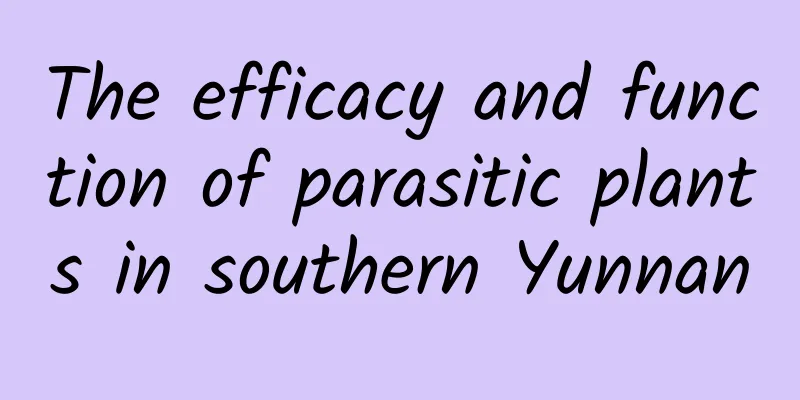The efficacy and function of parasitic plants in southern Yunnan

|
The traditional Chinese medicine Dian Nan parasitic plant is often used by people in real life because of its effects and efficacy. So, what are the effects and functions of Yunnan parasitism? Let us study it together. [Source] Medicinal material source: The leafy stems and branches on which the fruit of the rusty pear of the plant Mossaceae family is parasitic. [Original form] Shrub, about 1 meter high. Young branches and leaves densely covered with rusty long and short superimposed stellate hairs, which later become powdery and fall off; branchlets gray, glabrous, and lenticel-filled. Leaves are opposite, thin leathery; petiole 2-5mm long; leaf blade broadly elliptic or ovate, 5-10cm long, 2-5cm wide, obtuse or nearly rounded at the apex, rounded or shallowly cordate at the base, glabrous above, sparsely covered with short, overlapping stellate hairs or nearly glabrous below; lateral veins 5-8 pairs, slightly obvious on both sides. Inflorescence racemes, 1-2 axillary, inflorescences and flowers densely covered with rusty long superimposed stellate hairs, peduncle and inflorescence axis 3-10mm long, with 4-6 flowers; flowers brown, usually 3-4 densely packed in a whorl shape; bracts triangular; receptacle ovoid; epicalyx annular; corolla tubular in bud, 0.8-1.5cm long, slightly curved, swollen in the lower half, elliptical at the top, 4-lobed at the top when flowering, lobes lanceolate, about 4.5mm long, reflexed; style linear, stigma capitate. The berry is pear-shaped, 8-10mm long, 3-4mm in diameter, and covered with overlapping stellate hairs. The flowering period is from October to February of the following year. [Habitat distribution] Ecological environment: Grown in mountain evergreen broad-leaved forests at an altitude of 900-1800m, parasitic on plants such as emblica, prunus, and citrus. 【Nature and flavor】 Bitter; sweet; neutral 【Functions and indications】Relieve rheumatism; nourish the liver and kidneys; strengthen the tendons and bones; and stabilize the fetus. Mainly used for waist and knee pain; hemiplegia caused by stroke; numbness of hands and feet; restless fetus; fetal leakage [Usage and Dosage] For oral use: decoction, 10-15g; or soak in wine. 【Excerpt】 Chinese Materia Medica The above are the effects and functions of the Yunnan parasite. We can also eat the Yunnan parasite reasonably according to our own situation to alleviate the pain caused by the disease. |
<<: The efficacy and function of Pyrola
>>: The efficacy and function of Yunnan Hangzishao
Recommend
The efficacy and function of comb muscle relaxing grass
The traditional Chinese medicine Comb Soothing Gr...
China Academy of Transportation Science & Guazi Used Cars: 2017 China Major Cities Used Car Development Report
On April 25, 2018, the Urban Transportation and R...
The efficacy and function of floating grass
Piaofucao is a traditional Chinese medicinal mate...
What will happen if you eat one kiwi fruit every day? Will your skin become better? Will your bowel movements become smoother?
Kiwi is the perfect fruit in many people's mi...
The efficacy and function of Dianchi Begonia
Dianchi crabapple is a kind of Chinese herbal med...
The efficacy and function of pearls
Pearls are something that many people are very fa...
How do people wear masks in schools? What are the principles for campus disinfection? Chinese CDC experts explain five details about returning to school
Beijing's senior high school and junior high ...
The brightest "cosmic fireworks show" to date has been fully recorded and selected as one of the top ten scientific advances of the year. What does this achievement of "Lasso" tell us?
On February 29, 2024, the National Natural Scienc...
Effects and points of action of Rhizoma Anemarrhenae
Zhimu, cold in nature, slightly bitter and sweet ...
Why are konjac shreds white and konjac cubes black?
In summer, all the fat people know one thing: &qu...
The efficacy and function of jasmine leaves
Traditional Chinese medicine is very effective in...
The efficacy and function of sea cactus
Sea cactus is a famous traditional and commonly u...
What should I do if American ginseng is moldy?
My brother-in-law brought some American ginseng w...
The efficacy and function of Kuhulu
Kuhulu is a common Chinese medicine in clinical p...
What are the contraindications of taking kidney yang-tonifying Chinese medicine?
Due to the improvement of living standards and th...









